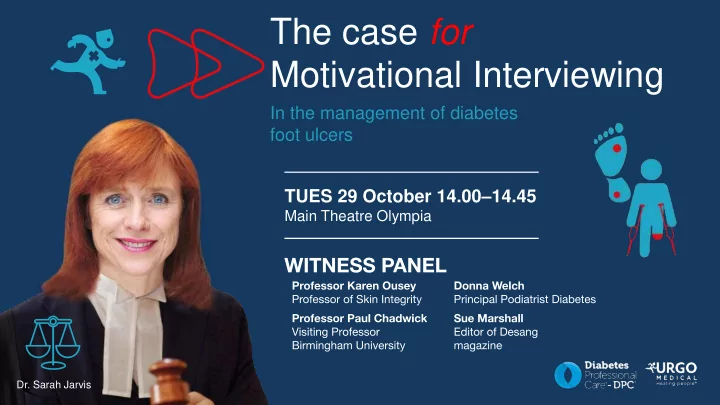

The case for Motivational Interviewing In the management of diabetes foot ulcers TUES 29 October 14.00 – 14.45 Main Theatre Olympia Dr. Sarah Jarvis
Motivational Interviewing vs Scare Tactics Welcome Dr. Sarah Jarvis
Motivational Interviewing vs Scare Tactics The case AGAINST Motivational Interviewing Dr. Sarah Jarvis
Motivational Interviewing vs Scare Tactics Witness Prof Paul Chadwick Visiting Professor Birmingham University 4
Prof Paul Chadwick
Risk Stratification 5% Active ulcers or infection Revascularisation or amputation Multidisciplinary foot care team management 5% 15% High risk 15% 20% Increased risk 20% Regular ‘foot protection’ 60% Low risk 60% Routine annual screening
Ivory tower / real world Is it the profession programme or the patient? Evidence
Academia
Not Fake News
Real World
DFU Risk Awareness Pilot Results Patients Do you want us to continue to use the poster and leaflet campaign with patients (T=55) 4% 9% No Yes Abs 87% Clinicians Do you want to continue to use the poster and leaflet campaign with patients (T=29) 14% 14% No Yes Abs 72% (Fox & Smith, 2018)
Informing & negotiating change X X X X ?
Latest evidence? o Robust evidence for DFD-prevention is lacking (Binning et al. 2018) o There remains a research GAP!
Back in the day
They made conclusions
Motivational Interviewing vs Scare Tactics The case FOR Motivational Interviewing Dr. Sarah Jarvis
Motivational Interviewing vs Scare Tactics Witness Prof Karen Ousey Professor of Skin Integrity University of Huddersfield 18
The Case FOR Motivational Interviewing Dr. Karen Ousey Professor of Skin Integrity University of Huddersfield
Scare Tactics vs. Motivation
Time • People with diabetes spend around 3 hours with a healthcare professional every year • The remaining 8,757 hours is self managed
Facts – Diabetes In one year the diabetes transformation DUK: fund has led to an extra: • UK’s first ever diabetic foot clinic in 1981 • 96 inpatient specialist nurses and related at King’s College Hospital staff in inpatient teams • After three years the number of major • 94,000 places on education courses being amputations had halved available • Mental health & emotional support – • DAFNE, X-PERT & DESMOND educational reducing ‘diabetes burnout’ programmes • 185 staff appointed to foot care teams across 80 hospitals • Putting Feet First campaign
Motivational Interviewing What is it? Process • Solution focused - Patient centred • Engaging – understanding the patient's point of view • Based on: • Focusing - developing one or more clear goals for ➢ How we speak to people change ➢ Listening and understanding ➢ The person who has the problem has the answer to • Evoking - patient’s own motivation for, and ideas solving it about, change ➢ People only change their behaviour when they feel • Planning - collaborative development of the next ready - not when they are told to do so steps that the individual is willing to take ➢ Solutions - person centred are the most enduring and effective
RULE Resist the urge to change the individual’s R course of action through didactic means Understand it’s the individual’s reasons U for change, not those of the practitioner, that will elicit a change in behaviour Listening is important; the solutions lie L within the individual, not the practitioner Empower the individual to understand that they E have the ability to change their behaviour 2
Supporting Change 2 • Precontemplation: • The patient does not believe there is a problem – e.g. I will not get a DFU • Contemplation: • Problem is recognised – e.g. maybe I will get a DFU • Action • Takes preventative action e.g. off loading • Maintenance I will wear the correct footwear • Relapse • Returns to undesired behaviours e.g. the weather is nice I am wearing no shoes
Motivational Interviewing – Agenda Setting Menu of diabetes topics • Patient is in charge YOUR MEDICATIONS YOUR FOOD • Improves patient confidence • Encourages self management YOUR BLOOD SUGAR YOUR EXERCISE MONITORING Please pick one topic for discussion today
Education • Stop commencing lectures with... • People who have diabetes are 15 times more likely to undergo amputations than other people without the condition • One amputation every hour, 24 per day and 169 per week take place due to complications from diabetes • We must link mental and physical health together for HCPs
Scare Tactics vs. MI • MI is the way forward! • The effective management of diabetes requires a lot of behaviour change for most patients • People tend to be ambivalent about change • Health professionals often resort to the “righting reflex” and overly rely on a directing style • When someone advocates for change with a person who is ambivalent about it, a natural response is to defend the other side
References • Prochaska, J.O. & DiClemente, C.C. (1986). Toward a comprehensive model of change. In W. Miller and N. Heather (Eds.), Addictive behaviors: Processes of Change . New York: Plenum Press, pp. 3-28. • S Rollnick, WR Miller and CC Butler. Motivational Interviewing in Health Care: Helping Patients Change Behavior. New York, New York: The Guilford Press. 2008. 210
Motivational Interviewing vs Scare Tactics The case AGAINST Motivational Interviewing Dr. Sarah Jarvis
Witness Donna Welch Principal Podiatrist Diabetes
Witness Donna Welch Principal Podiatrist Diabetes
Motivational Interviewing vs Scare Tactics The case FOR Motivational Interviewing Dr. Sarah Jarvis
Motivational Interviewing vs Scare Tactics Witness Sue Marshall Editor of Desang magazine 35
Sue Marshall
Why?
How?
The case for Motivational Interviewing In the management of diabetes foot ulcers Final Judgement Dr. Sarah Jarvis
Recommend
More recommend